US Baha'is Condemn Persecution Of Group In Iran
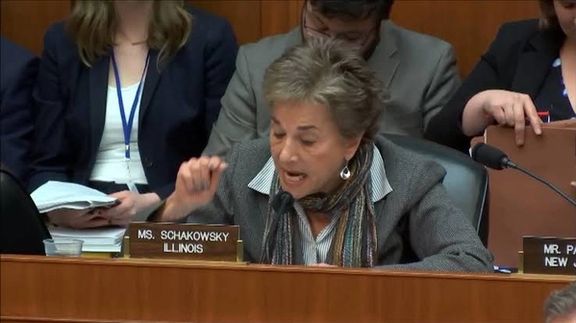
The Baha’i community of the United States has issued a condemnation of the ongoing persecution faced by the minority group in Iran.

The Baha’i community of the United States has issued a condemnation of the ongoing persecution faced by the minority group in Iran.
In a statement released on Tuesday, the community expressed its concern and anguish over the relentless oppression of the group of roughly 300,000 by the regime.
The focal point of the community's announcement is the unanimous passage of House Resolution 492 by the United States House of Representatives.
The crucial resolution, entitled Condemning the Government of Iran's State-Sponsored Persecution of the Baha’i Minority and Its Continued Violation of the International Covenants on Human Rights, was introduced by Congresswoman Jan Schakowsky [D-IL], supported by a bipartisan group of 28 cosponsors.
House Resolution 492 chronicles the sustained and egregious abuses suffered by the community in Iran since 1979, providing an irrefutable record of their persecution. The resolution emphatically calls on the regime of Iran to immediately cease its persecution of the Baha’is and denounces its continued violation of the Universal Declaration of Human Rights and the International Covenant on Civil and Political Rights.
The community's statement also reveals alarming statistics about the recent surge in persecution, beginning in June last year. During this period, over 300 incidents of raids, arrests, arraignments, sentencings, property confiscations, and denials of higher education have been documented. The pattern of oppression continues unabated, with nearly 60 Baha’is arrested or imprisoned, 26 receiving sentences or jail terms, and 59 Baha’i-owned properties forcibly sealed by authorities.
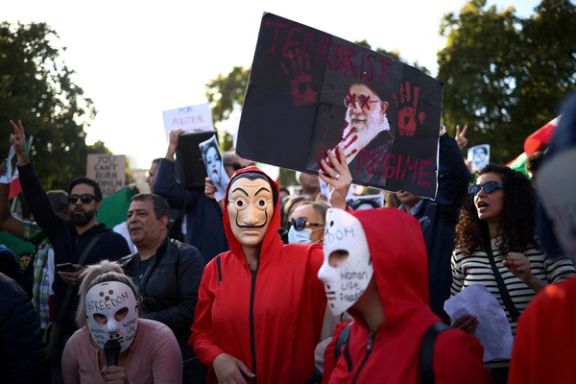
Like other prominent Iranian dissidents, Hamed Esmaeilion of Canada is urging the West to “stop appeasing the Islamic Republic” and “not hinder” the anti-regime movement.
In a note published Monday on his Instagram account ahead of last year’s nationwide protests anniversary on September 16, Esmaeilion accused the regime of simultaneously continuing its “hostage-taking policy” and “obeisance to China and Russia” to force the West into deals with the Islamic Republic.
Esmaeilion also said he would join other Iranians in Toronto, Canada, on September 16 “to chant “Woman, Life, Freedom”, the signature slogan of the movement that was sparked by the death of 22-year-old Mahsa Amini in the custody of morality police. “I know that sooner or later the Iranian people will topple the Islamic Republic.”
“We will neither forgive nor forget,” Esmaeilion, a dentist-writer who turned into a fierce activist when he lost his wife and young daughter in the downing of a commercial flight over Tehran in January 2020 by the Revolutionary Guards (IRGC), wrote.
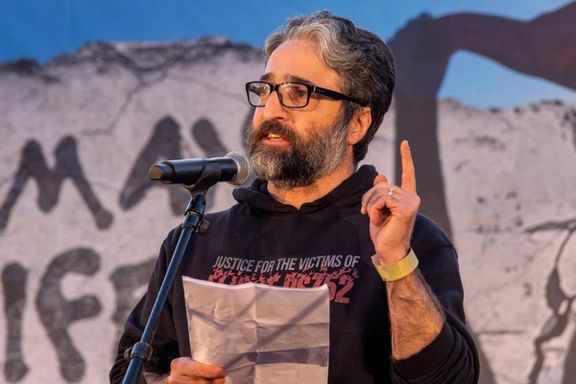
Expatriate Iranian have been planning anniversary demonstrations in several major world cities on Saturday some of which, including in Montreal, Canada, will be held outside US embassies and consulates.
A small group of Iranians staged a rally Monday outside the US Consulate in Toronto to protest what they allege is US government and Canadian “appeasement of the Islamic Republic.”
They were referring to the Biden administration’s decision to unfreeze $6b of the Islamic Republic’s frozen assets in South Korea and “encouraging hostage diplomacy by paying ransom” as well as demanding the US to impose maximum pressure on the regime.
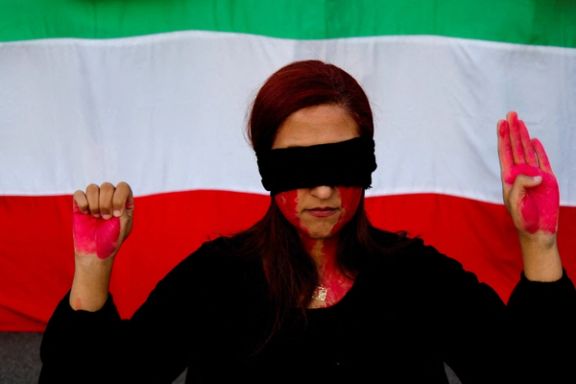
On Monday, the US Congress was informed that Secretary of State Antony Blinken has signed a waiver to allow international banks to transfer $6 billion of Iran’s frozen assets in a hostage release deal with Tehran. The State Department says Blinken determined that waiving the sanctions was in the national security interests of the United States.
Both Washington and Tehran since announcing the prisoner swap deal in August had claimed that the prisoner swap deal and the unblocking of the frozen funds were unrelated, but the waiver clearly links the two as one agreement.
"Allowing these funds to be transferred from restricted Iranian accounts held in the (Republic of Korea) to accounts in Qatar for humanitarian trade is necessary to facilitate the release of these US citizens," a US document seen by Reuters on Monday said.
The deal involves the release of five American citizens held in Iran and five Iranians held in the US. American lawmakers have been harshly criticizing the Biden administration for what they say is effective paying a huge ransom, which will only encourage the Iranian regime and endanger more Americans.
Other Iranian figures including exiled Prince Reza Pahlavi and activist Masih Alinejad have on many occasions in the past few years criticized the West for “appeasing the terrorist regime”.
In a Wall Street Journal opinion piece in August last year, the former crown prince said the way Western powers interacted with the Islamic Republic had emboldened it to continue its repressive measures against Iranians with greater immunity.
“Iranian people are not asking the Western countries to save them, they are asking the West to stop saving the Islamic Republic,” Alinejad said in a speech at Italy’s Senate in February.
“The West has always shown weakness against the Islamic Republic’s hostage-taking strategy and still wants to continue appeasing this government,” Canada-based data scientist and activist Ali Ashtari told Iran International TV in February, demanding that Western politicians and expatriate Iranians who “surrender to such humiliation be disgraced.”
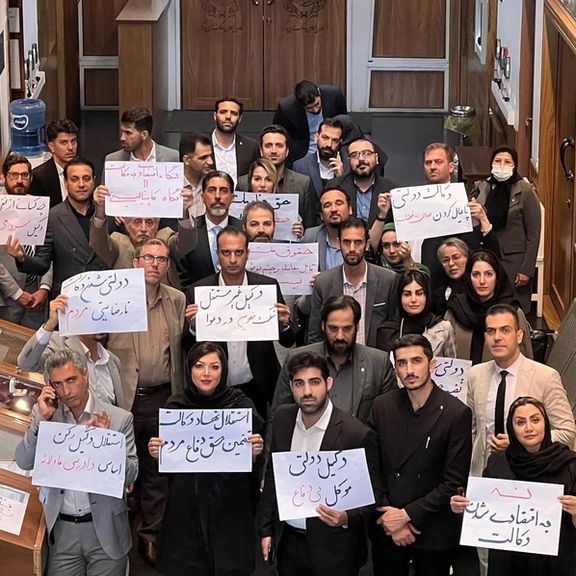
Dozens of lawyers in Iran held a demonstration on Tuesday to protest recent judicial reforms, which they say have raised significant challenges for human rights lawyers.
The lawyers, who had gathered outside the judiciary’s headquarters in Tehran, said the new reforms particularly hinder the lawyers who defend politically motivated cases including activists, dissidents, journalists, and artists targeted by the state.
The messages conveyed by their signs were unequivocal: "Lawyers' independence safeguards the defense of people's rights" and "Without independent lawyers, defendants are left defenseless."
Over time, Iranian bar associations have faced increasing pressures from governmental bodies and the judiciary. They have gradually seen their autonomy and authority erode through the enactment of various laws and a series of protests were seen at bar associations across the country in August.
On August 21, Iranian lawmakers passed a new bill that imposes a mandate on bar associations to comply with decisions made by the Regulatory Board of the Ministry of Economy, effectively rendering them as extensions of the government. The legislation restricts the possibility of challenging the decisions of the Regulatory Board in the Administrative Justice Court.
Among its provisions, the resolution confers authority upon the Ministry of Economy to issue, renew, and revoke attorney licenses. Lawyers contend that this move contradicts international legal standards and established regulations.
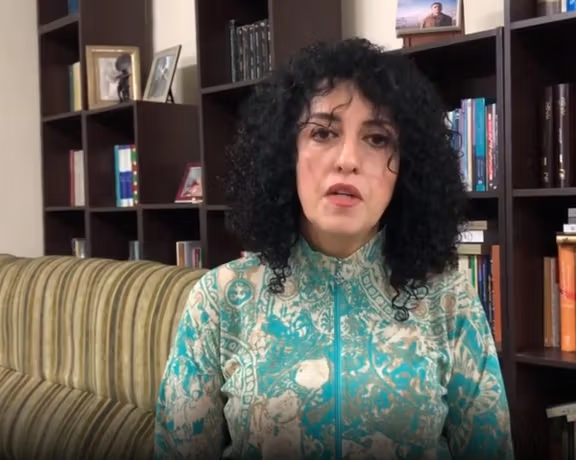
Renowned women's activist Narges Mohammadi claims she was physically assaulted on Monday for not adhering to mandatory hijab in the presence of prison authorities.
Mohammadi, who has repeatedly spoken out against human rights violations in Iranian prisons, including "sexual harassment and abuse of women" in detention facilities, was sentenced to an additional year of punitive imprisonment on charges of "advocating against the system through issuing statements from inside the prison."
The most recent incident was reported on her Instagram account. Mohammadi has become famed for raising awareness to the systematic abuse of women in Iranian prisons and in a bid to silence her, the authorities often refer to her as insane.
In recent years, innumerable reports have surfaced about the torture of political detainees and ordinary prisoners under various charges in Iranian prisons. Iran's Me Too Movement has also reported that sexual violence and intimidation has become a standard weapon against women by the regime, both inside and outside prison, with thousands of Iranian women seeking the support of the group since the unrest of September.
Mohammadi has published several letters from inside prison in support of the Iranian people's revolutionary movement, condemning the suppression of students and protestors, advocating for the rights of the Baha'i community, and others.
Iran's prison organizations issued a statement Tuesday dismissing the allegations.
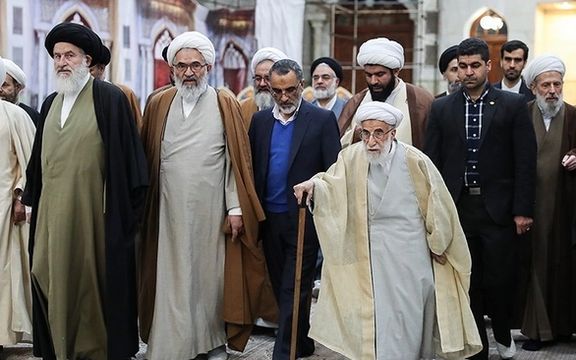
While many expect a dull Iranian election in March, some anticipate a notable showdown: Hardliner President Ebrahim Raisi against his predecessor, Hassan Rouhani.
The competition, however, does not take place in the parliamentary election, but in the simultaneously held Assembly of Experts where 88 clerics will be elected to a body most likely to determine Supreme Leader Ali Khamenei's successor at one point during its 8-year term.
Iranian journalist Ehsan Mazandarani's tweet highlighted the potential for a competition between Raisi and Rouhani should they both decide to run in the Tehran Province. Both individuals currently serve as members of the Assembly of Experts in the Tehran Province. It's worth noting that the Tehran Province has 16 representatives in the assembly, whereas the Province of Semnan has only one delegate.
Readers speculated that the Guardian Council might even disqualify Rouhani for the election to make sure that Raisi can make it to the Assembly smoothly without having to face Rouhani who appears to be more popular among the voters. A safe way out of trouble for Rouhani would be naming himself a candidate from his birthplace province of Semnan.
This makes sense, another reader pointed out, only if Iranians bother to take part in the March 2024 election. The latest two elections in Iran, the parliamentary vote in 2020 and the presidential election in 2021 had turnouts barely over 20 percent in most constituencies. That was too low in a country where an election turnout less than 60 percent was considered too bad.
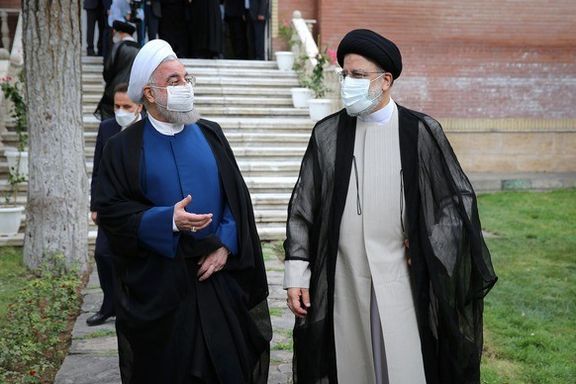
The disqualification of reformist and moderate candidates and the government's overwhelming biased campaign in favor of hardliners such as Raisi are said to be the reasons for the low turnout. With the massive protests in 2022 many observers are led to believe that the situation is likely to be even worse in March.
While there is significant concern among politicians regarding the parliamentary election and its turnout, there is a noticeable absence of discourse regarding the Assembly of Experts, where competition is minimal. Few Iranians can name three or four Assembly of Experts members, and even fewer are aware of the body's activities. Over the past 30 years, Khamenei has not permitted the assembly to scrutinize his performance. Rather than the Assembly supervising the leader's activities, it is Khamenei who imparts guidance to the Assembly of Experts during their annual meetings.
Some politicians, such as the Parties House Chairman Manouchehr Mottaki have politely and cautiously reminded that before deciding whether to take part in the elections or not, the people will look at the government's performance. What he meant was possibly the adverse impact of people's unhappiness about the government's economic performance which has made life difficult for nearly all walks of life in Iran.
Mottaki said that many Iranian political parties and their leaders fear that the March 2024 elections are likely to have low turnouts. Meanwhile, his comment about "some of the parties willing to take part in the elections," indicated that some of them may not be interested in the elections for the time being.
Equally pessimistic about the upcoming elections was hardliner politician Bijan Moqaddam who is close to the powerful core of the Islamic Republic. He said in an interview with Nameh News that the government's performance will have an impact on the election turnout. Meanwhile, to downplay the importance of the two last elections' extremely low turnout, Moqaddam said that the high turnout in the previous decades have raised people's expectations.
He remarked, "There are approximately six months left before the elections, and the government's actions could potentially stimulate increased participation." Moqaddam may have placed undue optimism in the Raisi administration's capacity to bring about positive change within this relatively brief timeframe.
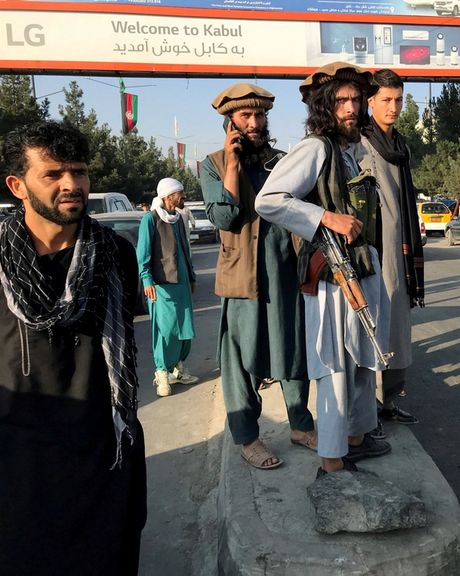
An Iranian daily has sounded the alarm regarding the potential danger posed by the Taliban along Iran's borders reflecting concerns in Tehran.
Jomhouri-e Eslami newspaper wrote of the critical need to address the issue, highlighting the risks posed to both the eastern regions of Iran and the broader geopolitical landscape, while Tehran usually downplays the issue in a bid to retain calm.
The editorial speaks of the plight of the people of the eastern part of the country and the prolonged water shortages they endure at the hands of the Taliban which continues to refuse to deliver Iran's water share from the Helmand River.
The newspaper claims that “safeguarding Iran's rights and ensuring border security while preventing the spread of negative consequences from the Taliban's authority in Afghanistan can be achieved through political means” in a call to arms to the nation.
Referencing the ruling Taliban leadership's two-year reign, the newspaper highlighted Afghanistan's 12% increase in the industrial production of narcotics and the surge in the production of methamphetamine. "This trend highlights the Taliban's reliance on the narcotics trade as a source of revenue, effectively engaging in drug terrorism," the newspaper wrote.
The editorial shows the regime's growing concern about its Afghan neighbors, which in May saw two Iranians killed and one Taliban soldier dead in a border dispute over water rights. In August, an aerial photo circulating on social media led to extensive criticism of the government for “conceding” thousands of hectares of Iranian land to the Taliban. The photo shows a 130 km long security wall built by Iran at some distance from the border demarcation line with Afghanistan which is along the Hirmand (Helmand) River.






